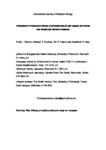Evaluation of interactive effects of phosphorus-32 and copper on marine and freshwater bivalve mollusks
| dc.contributor.author | Vernon, EL | |
| dc.contributor.author | Moore, MN | |
| dc.contributor.author | Bean, TP | |
| dc.contributor.author | Jha, Awadhesh | |
| dc.date.accessioned | 2021-11-09T14:30:04Z | |
| dc.date.available | 2021-11-09T14:30:04Z | |
| dc.date.issued | 2020-10-06 | |
| dc.identifier.issn | 0955-3002 | |
| dc.identifier.issn | 1362-3095 | |
| dc.identifier.uri | http://hdl.handle.net/10026.1/18267 | |
| dc.description.abstract |
PURPOSE: Contaminants seldom occur in isolation in the aquatic environment. While pollution of coastal and inland water bodies has received considerable attention to date, there is limited information on potential interactive effects between radionuclides and metals. Whether by accidental or controlled release, such contaminants co-exist in aquatic ecosystems and can pose an enhanced threat to biota. Using a range of biological responses, the study aimed to evaluate relative interactive effects on representative freshwater and marine bivalve species. METHODS: An integrated, multi-biomarker approach was adopted to investigate response to copper (Cu, 18 μg L-1), a known environmentally relevant genotoxic metal and differing concentrations of phosphorus-32 (32P; 0.1 and 1 mGy d-1), alone and in combination in marine (Mytilus galloprovincialis) and freshwater (Dreissena polymorpha) mussels. Genetic and molecular biomarkers were determined post-exposure and included DNA damage (as measured by the comet assay), micronuclei (MN) formation, γ-H2AX foci induction and the expression of key stress-related genes (i.e. hsp70/90, sod, cat, gst). RESULTS: Overall, using a tissue-specific (i.e. gill and digestive gland) approach, genotoxic response was reflective of exposures where Cu had a slight additive effect on 32P-induced damage across the species (but not all), cell types and dose rates. Multivariate analysis found significant correlations between comet and γ-H2AX assays, across both the tissues. Transcriptional expression of selected genes were generally unaltered in response to contaminant exposures, independent of species or tissues. CONCLUSIONS: Our study is the first to explore the interactive effects of ionizing radiation (IR) and Cu on two bivalve species representing two ecological habitats. The complexity of IR-metal interactions demonstrate that extrapolation of findings obtained from single stressor studies into field conditions could be misrepresentative of real-world environments. In turn, environmental protective strategies deemed suitable in protecting biota from a single, isolated stressor may not be wholly adequate. | |
| dc.format.extent | 1-14 | |
| dc.format.medium | Print-Electronic | |
| dc.language | en | |
| dc.language.iso | en | |
| dc.publisher | Taylor and Francis | |
| dc.subject | Bivalve | |
| dc.subject | 32Phosphorus (32P) | |
| dc.subject | genotoxicity | |
| dc.subject | gene expression | |
| dc.subject | metal | |
| dc.title | Evaluation of interactive effects of phosphorus-32 and copper on marine and freshwater bivalve mollusks | |
| dc.type | journal-article | |
| dc.type | Journal Article | |
| dc.type | Research Support, Non-U.S. Gov't | |
| plymouth.author-url | https://www.webofscience.com/api/gateway?GWVersion=2&SrcApp=PARTNER_APP&SrcAuth=LinksAMR&KeyUT=WOS:000575623300001&DestLinkType=FullRecord&DestApp=ALL_WOS&UsrCustomerID=11bb513d99f797142bcfeffcc58ea008 | |
| plymouth.issue | 6 | |
| plymouth.volume | 98 | |
| plymouth.publication-status | Published | |
| plymouth.journal | International Journal of Radiation Biology | |
| dc.identifier.doi | 10.1080/09553002.2020.1823032 | |
| plymouth.organisational-group | /Plymouth | |
| plymouth.organisational-group | /Plymouth/Admin Group - REF | |
| plymouth.organisational-group | /Plymouth/Admin Group - REF/REF Admin Group - FoSE | |
| plymouth.organisational-group | /Plymouth/Faculty of Science and Engineering | |
| plymouth.organisational-group | /Plymouth/Faculty of Science and Engineering/School of Biological and Marine Sciences | |
| plymouth.organisational-group | /Plymouth/REF 2021 Researchers by UoA | |
| plymouth.organisational-group | /Plymouth/REF 2021 Researchers by UoA/UoA06 Agriculture, Veterinary and Food Science | |
| plymouth.organisational-group | /Plymouth/Research Groups | |
| plymouth.organisational-group | /Plymouth/Research Groups/Marine Institute | |
| plymouth.organisational-group | /Plymouth/Users by role | |
| plymouth.organisational-group | /Plymouth/Users by role/Academics | |
| plymouth.organisational-group | /Plymouth/Users by role/Researchers in ResearchFish submission | |
| dc.publisher.place | England | |
| dcterms.dateAccepted | 2020-09-09 | |
| dc.rights.embargodate | 2021-11-10 | |
| dc.identifier.eissn | 1362-3095 | |
| dc.rights.embargoperiod | Not known | |
| rioxxterms.versionofrecord | 10.1080/09553002.2020.1823032 | |
| rioxxterms.licenseref.uri | http://www.rioxx.net/licenses/all-rights-reserved | |
| rioxxterms.licenseref.startdate | 2020-10-06 | |
| rioxxterms.type | Journal Article/Review |


